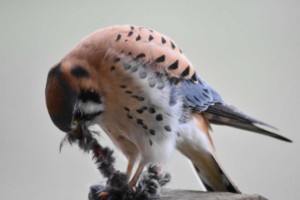Today I literally rousted my husband from his “throne”, hustling him out of one room and up to our bedroom – all the while encouraging him to “be quiet.” On silent feet, I motioned him over to the window. The scene outside was like something from one of my favorite nature shows (yep, I can’t get enough to that NatGeo channel). Perched grandly on one of our deck posts was a small falcon feasting on a freshly caught mouse. Yuck, some of you may say. I get it, and thought it, too. And before I go further, I do want to say that I was very sad for the cute little mouse. Yet, the longer I watched and snapped pictures, the more I found myself appreciating the falcon for the stunningly beautiful bird of prey it is and the job it does with the unique skills it’s been given.
 The tiny falcon, or American Kestrel as this slight breed is known, may be the smallest and most common falcon in North American yet it’s one of the most widely used birds in falconry. Though not as strong a flyer as many other larger falcons, proper training and weight control by the falconer allows many kestrels to become effective hunters of birds, with occasion success against birds up to almost twice their weight! Impressive. Seems that proper training and skill honing work darned well in the animal kingdom, too, improving strength, agility, ability and productivity. It certainly makes them stand out from their feathery counterparts.
The tiny falcon, or American Kestrel as this slight breed is known, may be the smallest and most common falcon in North American yet it’s one of the most widely used birds in falconry. Though not as strong a flyer as many other larger falcons, proper training and weight control by the falconer allows many kestrels to become effective hunters of birds, with occasion success against birds up to almost twice their weight! Impressive. Seems that proper training and skill honing work darned well in the animal kingdom, too, improving strength, agility, ability and productivity. It certainly makes them stand out from their feathery counterparts.
Which got me thinking, but please don’t let that scare you. Here’s how it shakes out in my head. We, much like the falcon (or the mouse), are all part of a larger cog. A cycle that’s much bigger than we are yet somehow, some way we all, distinctly possess our own, individual and unique skills that we bring to this crazy cool world, to the ever spinning circle of life (go ahead, sing the song. I did).
What I wanted to know, nay – what I needed to know was how this diminutive bird of prey could be trained to take on something twice his or her size. What is it that brings out this unique skill, raising it from tiny feather falcon to a flying bad ass? Well, one of the most intriguing things I discovered was these birds need to know they have a distinct advantage over their intended prey in order to give chase. In other words, they must recognize their unique benefit, before engaging. Interesting. Weighing the odds of success? A bird? Heck, most times I don’t even do that – jumping recklessly into the fray without considering the potential outcome rather than, taking the falcon’s approach and applying my unique skills to the situation before leaping. A novel idea! This approach most likely would increase my chances of a more beneficial outcome – be the falcon, Michelle, be the falcon!
So then I started pondering MY own unique skills. What attributes do I possess that sets me apart? My first answer…nothing! Many of you are probably thinking the same thing. My response to you? Not so! We ALL have unique skills – some of you dear readers may be very aware of what they are while others, like me, may have to think on it for a bit. But the bonus of this story, amidst all the feathers and the fur and the fun and the tangents, is that you CAN identify your unique skills. In fact, we’ve got three ways to suggest below, if you want to be the falcon. Or you can always opt to be the mouse – they’re sure cute…and delicious!
3 Ways to Identify Your Unique Skills
All of us have at least one disruptive skill — an ability that we are uniquely good at that sets us apart from others (think of the falcon!). You may have been fine tuning yours for years, or you may be so innately good at it that you don’t even notice it. Here are three ways to help you identify your unique skill:
- Watch your reflexes. You may instinctively do what you’re good at without even being aware of it. Ask yourself: when I feel most successful or invigorated, or intelligent or capable, what am I doing?
- Look for confluences. A distinct skill may not be one thing, rather it could be an unusual intersection or combination of ordinary proficiencies.
- Listen to compliments. Peers, managers, direct reports, and even spouses are often good mirrors of your inherent strengths. Don’t habitually dismiss compliments, but mine them, draw them out for your unique skills.
